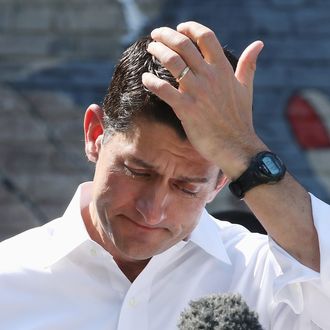
On the final night of primary season — after a week spent questioning the capacity of Mexican Americans to recognize a legitimate real-estate school when they see one — Donald Trump chained himself to a teleprompter. Standing in front of several American flags and family members, the GOP nominee got through an entire speech without saying anything his co-partisans would have to distance themselves from.
Elected Republicans started breathing a little easier. Trump had gotten the message: He would stay on message. And even if Trump’s scripted speeches still took an approach to trade and foreign policy that was antithetical to the party line, as long as the standard-bearer stopped drawing attention to his own racism and legal woes, Mitch McConnell would sleep at night.
And then Omar Mateen killed 49 people in the Pulse nightclub, and the GOP nominee accepted congratulations. And then called for the president’s resignation. And then suggested the president might be sabotaging our counterterrorism efforts to execute some unspeakable design.
Trump had been slated to give a “major speech” Monday even before the massacre in Orlando. That speech now appeared critical; it was an opportunity to erase the messaging errors of the past 48 hours and to center the general-election fight on the authoritarian-friendly terrain of national security. All eyes turned to Trump; his eyes turned to the teleprompter.
The Republican nominee proceeded to reframe the 2016 election as a referendum on a proposal his party’s leadership universally condemns. Trump didn’t merely revive his Muslim ban — he radically extended its scope. To avoid the logistical challenge of determining the true religious commitments of every individual immigrant, the mogul proposed a blanket ban on immigration from “areas of the world when there is a proven history of terrorism against the United States, Europe or our allies.” Of course, the most recent high-profile terrorist attacks against America and Europe have largely been carried out by Americans and Europeans. In positing immigration policy as a solution to a mass murder carried out by an American citizen born in New York, Trump argued Omar Mateen’s parents never should have been allowed into the country. While the GOP nominee insisted his ban would be temporary, he also argued that it wouldn’t be lifted until the United States can “perfectly screen” incoming Muslims — an impossible feat if one wishes to screen for the ideological leanings of an immigrant’s unborn children.
Trump’s speech was scripted. The candidate was on message. And that message made life a little harder for Republican lawmakers.
“[Trump] just blows up everything we want to do,” a senior GOP lawmaker told Politico. “Every time you turn around, he’s said something new. It’s impossible for us to keep up.”
“Saying nothing would have been better,” one member of the Republican National Committee told the publication. “Every Senate candidate will be forced to answer for Trump’s bizarre response. … His lack of empathy is jarring.”
Democrats’ Senate challenger in Pennsylvania, Katie McGinty, called on incumbent Republican Pat Toomey to denounce Trump’s remarks. Texas senator John Cornyn mocked a reporter’s request for a response, saying, “There you go again, asking about Trump” — as if the mogul were still a fringe figure and not his party’s presidential nominee. “I’m not gonna make a career out of responding to every comment and every tweet,” Mississippi senator Roger Wicker scoffed at a gaggle of reporters following a leadership meeting.
For elected Republicans, the most dangerous thing about Trump’s revived Muslim ban may be its popularity. Throughout the 2016 campaign, Trump has heightened the contradictions between the party’s rank and file and the rest of the country, including the GOP donor class. In March, a poll found that 71 percent of Republican voters favor the ban, compared with 49 percent of independents and 34 percent of Democrats. Among big-dollar GOP donors, who tend to favor expansive immigration policies and oppose overt racism, that percentage is likely quite small.
Trump’s speech was designed to intensify support for the ban among that 71 percent. The mogul elevated the stakes of his proposal to apocalyptic heights, arguing that if our current immigration system remains in place, “we’re not going to have a country anymore — there will be nothing left.”
If the GOP nominee succeeds in increasing the issue’s salience, the task facing blue- and purple-state Republican senators will become more daunting: Disavowing the ban alienates your base; embracing it alienates the crossover voters you need to win statewide.
Trump is back on message. And Republicans don’t know what to say.






























